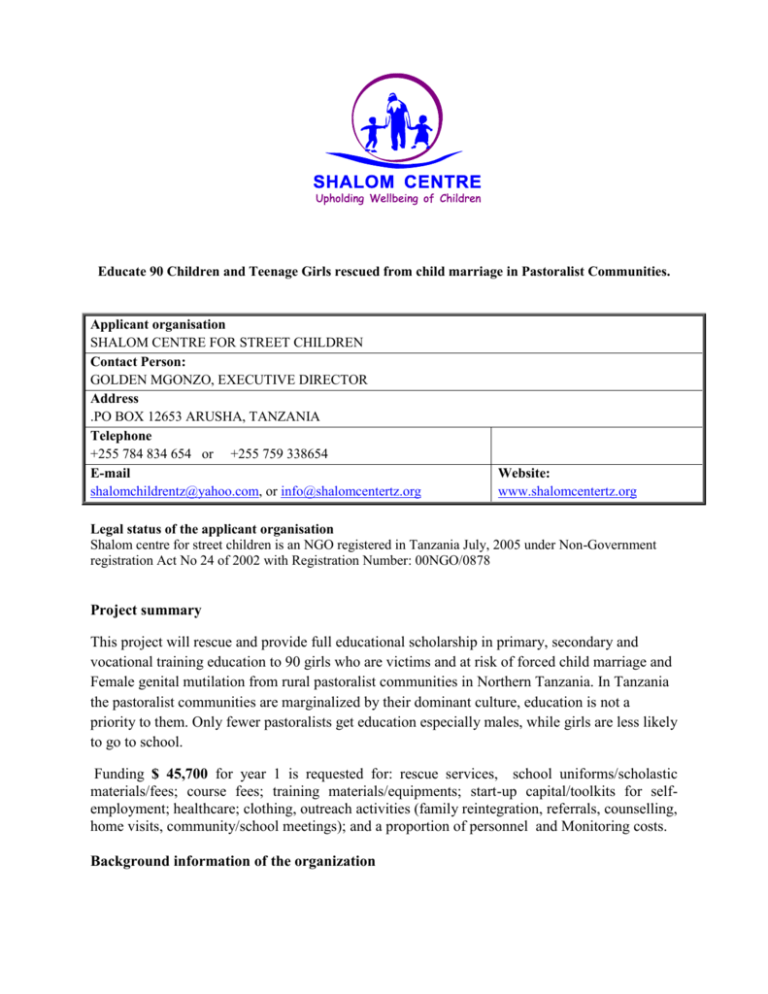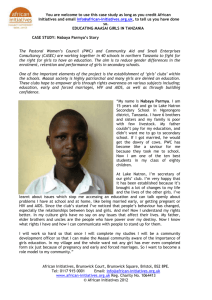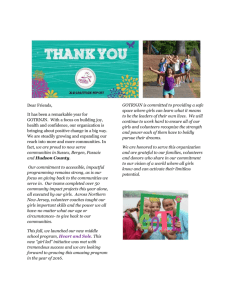(projdoc).
advertisement

Educate 90 Children and Teenage Girls rescued from child marriage in Pastoralist Communities. Applicant organisation SHALOM CENTRE FOR STREET CHILDREN Contact Person: GOLDEN MGONZO, EXECUTIVE DIRECTOR Address .PO BOX 12653 ARUSHA, TANZANIA Telephone +255 784 834 654 or +255 759 338654 E-mail shalomchildrentz@yahoo.com, or info@shalomcentertz.org Website: www.shalomcentertz.org Legal status of the applicant organisation Shalom centre for street children is an NGO registered in Tanzania July, 2005 under Non-Government registration Act No 24 of 2002 with Registration Number: 00NGO/0878 Project summary This project will rescue and provide full educational scholarship in primary, secondary and vocational training education to 90 girls who are victims and at risk of forced child marriage and Female genital mutilation from rural pastoralist communities in Northern Tanzania. In Tanzania the pastoralist communities are marginalized by their dominant culture, education is not a priority to them. Only fewer pastoralists get education especially males, while girls are less likely to go to school. Funding $ 45,700 for year 1 is requested for: rescue services, school uniforms/scholastic materials/fees; course fees; training materials/equipments; start-up capital/toolkits for selfemployment; healthcare; clothing, outreach activities (family reintegration, referrals, counselling, home visits, community/school meetings); and a proportion of personnel and Monitoring costs. Background information of the organization Shalom centre is a Non Profit, Non -governmental, Non-Political Civil Society Organization that is actively engaged in addressing the problem children and youth in crisis. Shalom Centre was established in 2005 works to break cycles of violence, hatred and despair by providing psychosocial, emotional, educational, and economical to survivors of conflict especially of poverty, abuse and gender related violence. Our work enables these survivors to come to terms with their past experiences, make the most of their present and build a better future. The organization particularly works among street children, orphans, youth/girls and children in crisis. Apart from other projects, Shalom has been involved of caring individuals, male and female, who want to see the end of harmful cultural practices such as female genital mutilation (FGM) and forced child marriages of young girls. The project background and need There are 500,000 vulnerable children from the pastoralist community, the Maasai in northern Tanzania who don’t prioritize education to their children. Maasai girls face forced child marriages, less likely to go to school, less likely to stay in school. This project will affect about 100 pastoralist girls. Facts about status of children in Tanzania survey done by UNICEF in 2010 shows; 8m Children are living in poverty 1 in 4 Girls under 18 have already begun childbearing 8,000 Girls drop out of school every year due to pregnancy 9 in 10 Children in rural areas are not enrolled in secondary school Education challenge: In the pastoralist communities of Northern Tanzania, pastoralist’s children especially girls are highly marginalized, and are at risk of sexual exploitation through forced child marriage, domestic violence, abuse of human rights and not getting education. There has been insufficient education efforts and institutional development for the Maasai to understand and benefit from educational achievement. The girls are left at homes not sending them to schools they are kept only for marriage and most to the old age polygamy men. The boys are assigned for taking care of the cattle not going to school. Typically, Maasai children enter First Grade at age seven without prior exposure to classroom-based teaching, without basic skills, such as counting and writing, typical among other Tanzanian children, and without an understanding of Swahili, ,which is the only legally permitted language, other than English, in schools. They are set up for failure from the beginning; not surprisingly, many drop-out before the end of Primary School, and almost half do not pass the Grade 7 examinations, which are critical to entering Secondary School). Consequently, as compared to other communities throughout Tanzania, the Maasai have far less children succeeding at all levels in school. The result the poverty level in the pastoralist community is paramount, the Maasai are poorly represented in jobs of influence; for example there are relatively few Maasai teaching in the local schools, and there are even fewer working in local health clinics or conducting social services. Maasai are also under-represented in local governing bodies; many District levels positions related to land, livestock, natural resources, etc. are filled by non-Maasai, who sometimes make decisions on behalf of the community with little knowledge about and/or prejudice against it! The project goals, objectives and activities Goals 1. Reduce and eradicate the incidences of forced child marriage, female genital mutilation and school drop out for Girls from the pastoralists’ communities (the Maasai) in northern Tanzania. 2. Promoting the right to education for pastoralist children to access primary, secondary and vocational education for the deserving ones achieve their dreams 3. Promoting and protecting human rights and living conditions of the pastoralist girls and young women by addressing the needs for educational, economical and social empowerment; How to solve the problem Shalom provides basic needs to rescued girls from forced child marriage, female genital mutilation and child labour/torture. Provide educational sponsorships for girls to attend primary and secondary education. Secondary school girls will be placed in boarding schools. Rescued girls not fit in these school levels will be placed at Shalom Rescue Centre whilst provided with vocational training skills in tailoring, hair dressing and cookery for 3-6 months at the Centre for eventual employment. Strategy activities (1) Providing 3-6 month training (tailoring, hairdressing, and cookery) to 30 teenage girls rescued from child marriage and female genital mutilation, as well as training in entrepreneurship, reproductive health and life skills; (2) Supporting 30 trainees’ graduates to find meaningful employment through linkage to local employers or provision of start-up capital and equipment to establish their own businesses; (3) Providing educational support, including uniforms, payment of school fees, scholastic materials and home/school visits, to 60 children who have rescued from child marriage, genital mutilation, poor school attendance or have dropped out completely ( 30 in primary school and 30 in secondary school) Specific Activities Outcome 1: Enrol and support the costs of vocational training for 30 teenage girls and young women per year; Provide start-up capital/equipment (e.g. sewing machines) to girls/women on completion of training; Conduct monthly training on entrepreneurship, business, reproductive health and life skills. Outcome 2: Provide school uniforms, scholastic materials, and clothing for 60 at-risk primary and secondary school Conduct weekly home visits and follow-up with schools. Impact The project will educate 100 Masai girls allowing them to reach educational goals by completion of primary, secondary and tertiary education giving them a greater chance for employment become capable of caring for themselves, raising advantaged families and reduces poverty and gender based violence and positively impacts confidence and self-esteem, role model and leading meaning lives. Projects also help build women's skills, earn an income and invest in small-scale enterprises to prosperity. Sustainability The project engages as many stakeholders as possible through a participatory approach during planning, implementation and evaluation. This encourages community involvement and ownership, which will ensure the sustainability of the project once Shalom scales down its input. For example, in collaboration with local leaders, Shalom has identified and recruited nine community volunteers who support a number of project activities, including home visits to children; educating community members about child protection; responding to and reporting child abuse cases; and providing life skills. PROJECT BUDGET PROJECT HOLDER A 1.0 A 1.1 A 1.2 A 1.3 A 1.4 A 1.5 A 1.6 A PROJECT TITLE PROJECT PERIOD CURRENCY SHALOM CENTRE FOR STREET CHILDREN RESCUE 90 CHILD MARRIAGE VICTIMS IN TANZANIA ONE YEAR USD Descriptions QUATITY UNIT COST AMOUNT IN USD PROJECT ACTIVITIES 3 meals to girl for 60 girls at centre(60$ per day) 12 1,800 21,600.00 Education cost - Primary School 30 90 2,700.00 Education cost - secondary School 30 300 9,000.00 Health Care 12 200 2,400.00 Tool Kit- Sewing machine 10 170 1,700.00 Tool Kit- cooking facility for self employment Tool Kit- hair Dressing 10 10 240 440 2,400.00 4,400.00 1.7 A 1.8 A 1. Entrepreneur & Life Skill Training for 30 girls 3 TOTAL PROJECT ACTIVITIES GRAND TOTAL 500 1,500.00 45,700.00 #REF! #REF! Notes: This budget is for 30 Girls in primary school, 30 Girls in Secondary schools. 30 Girls in Vocational training Centre at Shalom rescue centre. Secondary Girls will be in Boarding schools While Primary will be enrolled to nearby schools at the rescue centre Vocational Girls will stay and receive training at the Shalom Rescue Centre.






